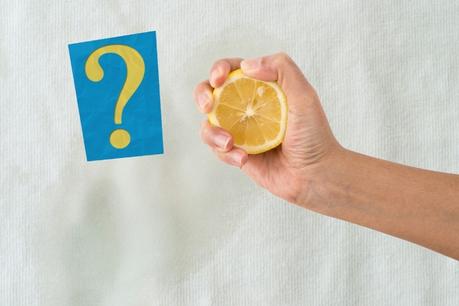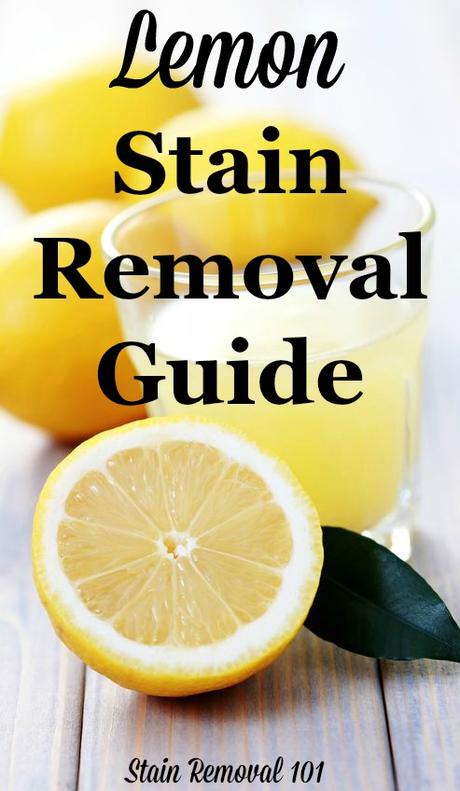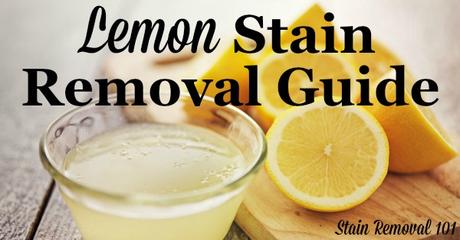Yes, lemon juice can stain clothes due to its natural acidic properties. Lemon juice, a common household ingredient known for its versatility in cooking and cleaning, can also have an unwelcome side effect on clothing.
With its natural acidic properties, lemon juice can leave behind stubborn stains that are difficult to remove. Whether it’s a spill while making lemonade or accidentally brushing against a lemon tree, the potential for an unsightly mark on your clothes is there.
Understanding how lemon juice stains work and taking prompt action can help minimize the damage and keep your clothes looking their best. We will explore the reasons behind lemon juice stains on clothes and discuss effective methods for treating and preventing them.
Lemon Juice
Lemon juice can potentially leave stains on clothes due to its natural acidity. It is important to be cautious when handling it and to promptly treat any spills or splatters to minimize the risk of staining.
Composition Of Lemon Juice
Lemon juice is derived from the yellow citrus fruit, lemon (Citrus limon). It is primarily composed of water, containing approximately 90-95% water content. Alongside water, lemon juice also contains a combination of elements that contribute to its unique properties and characteristics. These elements include:
- Citric Acid: The most significant component of lemon juice is citric acid, which gives it its distinctive tart taste.
- Vitamin C: Lemon juice is known for its high vitamin C content, which provides several health benefits.
- Essential oils: Lemon juice contains natural essential oils, which give it a refreshing aroma and flavor.
- Flavonoids: This natural pigment found in lemon juice contributes to its vibrant yellow color.
Acidity Of Lemon Juice
Lemon juice is highly acidic due to the presence of citric acid. The pH level of lemon juice typically ranges between 2 and 3. This acidity is one of the reasons why lemon juice is widely used in cooking, baking, and as a natural cleaning agent. The acidic nature of lemon juice also makes it effective for its various health and beauty applications.
When it comes to using lemon juice on clothes, its acidity can have an impact on certain fabrics and dyes. However, it is essential to note that not all fabrics react the same way to lemon juice.
If you are concerned about potential staining, it is recommended to test a small, inconspicuous area of the fabric with lemon juice before applying it to a larger portion. This simple test will help you determine if the fabric is compatible with lemon juice or if it is likely to experience discoloration or damage.
Furthermore, it is worth mentioning that lemon juice may have a stronger effect on light-colored or delicate fabrics compared to darker or more robust materials. The acidity of lemon juice can bleach or lighten certain fabrics, particularly when exposed to sunlight. Therefore, it is crucial to exercise caution and carry out a spot test to avoid any unwanted stains or damage.
While lemon juice can potentially stain clothes due to its acidity and natural pigments, its effect may vary based on the fabric type, color, and exposure to sunlight. By understanding the composition and acidity level of lemon juice, you can make informed decisions when using it for various purposes.

Credit: inthewash.co.uk
Factors Affecting Staining
When it comes to experimenting with natural remedies, lemon juice is often a go-to solution for its versatility and effectiveness. However, before reaching for that bottle of lemon juice to tackle a stain on your clothes, it’s important to consider the factors that can affect staining. Understanding these factors will help you determine whether lemon juice is a suitable stain remover for your specific fabric type and lemon juice concentration.
Fabric Type
The type of fabric plays a crucial role in determining whether lemon juice will stain your clothes. While lemon juice is generally considered safe on most fabrics, certain delicate materials may not react well to its acidic nature. Fabrics such as silk, wool, and rayon are more sensitive and prone to damage, including potential staining, when exposed to lemon juice.
On the other hand, sturdy fabrics like cotton, polyester, and denim are less likely to stain due to their ability to withstand acidic substances. It’s always recommended to spot test a small, inconspicuous area of your fabric before using lemon juice as a stain remover, especially when dealing with delicate or unknown fabric types.
Lemon Juice Concentration
The concentration of lemon juice used can also influence whether it will cause stains on your clothes. Undiluted or highly concentrated lemon juice has a greater chance of leaving behind visible marks. When applying lemon juice as a stain remover, diluting it with water can help reduce acidity and minimize the risk of staining.
Moreover, the pH level of the lemon juice you’re using can also impact its staining potential. Lemon juice with a higher pH tends to be more acidic and can increase the likelihood of leaving stains. Therefore, opting for fresh lemon juice or a lower pH lemon juice equivalent is advisable when attempting stain removal.
In addition, the duration of exposure between the lemon juice and the fabric can contribute to staining. The longer the lemon juice sits on your clothes, the higher the chances of it leaving a mark. Promptly rinsing and laundering the garment after treating the stain will help minimize the potential for lemon juice stains.
Remember, while lemon juice can be an effective natural stain remover, it’s crucial to consider the fabric type and lemon juice concentration to avoid any unwanted staining. With proper care and attention, lemon juice can be a powerful ally in your battle against stains.
Preventing Lemon Juice Stains
Dealing with stubborn stains on clothes can be frustrating, especially when it comes to pesky lemon juice stains. While lemon juice has many benefits, it’s no secret that its high acidity can leave behind unsightly stains. However, with the right approach, you can prevent lemon juice stains from ruining your favorite garments. In this article, we’ll cover everything you need to know about pre-treating stains and effective washing techniques to keep your clothes looking fresh and stain-free.
Pre-treating Stains
When it comes to lemon juice stains, taking quick action is the key to preventing the stain from setting in. Here are some effective pre-treating methods to remove lemon juice stains:
- Blot the Stain: Start by blotting the stain gently with a clean cloth or paper towel. Avoid rubbing the stain, as it can spread the lemon juice and make the stain worse.
- Rinse with Cold Water: Rinse the stained area with cold water. The cold water will help dilute the acidity of the lemon juice and prevent it from further penetrating the fabric.
- Apply Stain Remover: Prior to washing, apply a stain remover specifically designed for acidic stains like lemon juice. Follow the instructions on the product and allow it to work its magic for the recommended time.
- Check for Stain: Once you have pre-treated the stain, double-check to ensure it has been effectively removed before proceeding to the washing step.
Washing Techniques
Now that you have successfully pre-treated the lemon juice stain, it’s time to tackle the washing process. Follow these washing techniques to ensure your clothes come out stain-free:
- Check the Garment Care Label: Before washing, always check the garment care label for specific instructions. Different fabrics may require different washing methods.
- Use Cold Water: When washing clothes with lemon juice stains, opt for cold water instead of hot. Cold water helps in preventing further set-in of the stain and ensures the best chance of removal.
- Choose the Right Detergent: Select a laundry detergent that is suitable for your fabric type and gently work it into the stained area with your fingers. Allow the detergent to penetrate the fibers for a few minutes.
- Gentle Cycle: If possible, choose a gentle cycle option on your washing machine. This will ensure that the fabric is not overly agitated, which can exacerbate the stain.
- Inspect and Repeat: After washing, carefully inspect the garment to check if the stain has been completely removed. If any residue remains, repeat the pre-treating and washing process until the stain is gone.
By following these pre-treating and washing techniques, you can effectively prevent and treat lemon juice stains. Remember to always act quickly, choose the correct products, and treat your garments with care to keep them looking fresh and stain-free. Now you can enjoy the benefits of lemon juice without worrying about its potential for staining clothes.

Credit: www.stain-removal-101.com
Removing Lemon Juice Stains
Lemon juice can stain clothes, but there are ways to remove the stains. Avoid this by taking immediate action and treating the affected area with a mixture of dish soap and water, or vinegar and baking soda.
Lemon juice is a common ingredient used in cooking and various household tasks. However, when it accidentally spills on your clothes, it can leave behind unsightly stains. The good news is that there are effective ways to remove lemon juice stains and restore your clothes to their former glory. In this section, we will discuss some safe and practical methods for treating these stubborn stains.
Safely Treating Stains
When it comes to removing lemon juice stains from clothes, it’s essential to proceed with caution to avoid causing further damage. Here are some safe and effective methods you can try:
Cleaning Tips
To successfully eliminate lemon juice stains, follow these cleaning tips:
- Act quickly: As soon as you notice the stain, take immediate action. The longer you wait, the more difficult it becomes to remove the stain.
- Blot the stain: Start by gently blotting the affected area with a clean, absorbent cloth or paper towel. Avoid rubbing the stain, as this can push it further into the fabric.
- Pre-treat with liquid detergent: Apply a small amount of liquid detergent directly to the stain. Gently rub the detergent into the fabric using your fingers or a soft brush.
- Rinse with cold water: Rinse the stained area with cold water to remove the detergent and any loosened particles of the stain. Hot water can cause the stain to set, making it harder to remove.
- Apply stain remover: If the stain persists, treat it with a specialized stain remover. Follow the manufacturer’s instructions and make sure the product is suitable for the fabric of your garment.
- Wash as usual: Launder the garment as you normally would, using the recommended temperature and detergent. Check the stain before drying, as heat can set any remaining residue.
Remember, it’s always recommended to test any cleaning product or method on a small, inconspicuous area of the fabric before applying it to the entire stain. This helps ensure that the treatment doesn’t cause discoloration or damage.
With these simple but effective cleaning tips, you can say goodbye to those lemon juice stains and keep your clothes looking fresh and clean.

Credit: www.stain-removal-101.com
Frequently Asked Questions For Will Lemon Juice Stain Clothes?
Will Lemon Juice Damage Clothes?
Lemon juice can potentially damage clothes due to its natural bleaching properties. It’s always recommended to dilute it with water and test it on a small, inconspicuous area first.
Does Lemon Juice Dye Clothes?
Yes, lemon juice can dye clothes due to its natural bleaching properties. It can leave stains, especially on lighter fabrics or when exposed to sunlight. Be cautious and avoid getting lemon juice on your clothes if you don’t want them to be stained.
How Do You Get Lemon Juice Stains Out?
To remove lemon juice stains, mix equal parts water and white vinegar, then dab the mixture onto the stain using a clean cloth. Gently rub the area in circular motions, rinse with cold water, and blot dry.
Can I Use Lemon Juice In With Clothes?
Yes, you can use lemon juice on clothes. It acts as a natural bleach and stain remover due to its citric acid. Simply dab the juice on stains or add it to your laundry detergent for an extra boost of freshness.
However, test it on a small area first to avoid any potential damage.
Can Lemon Juice Cause Stains On Clothes?
Yes, lemon juice can cause stains on clothes due to its natural acidity.
Conclusion
To wrap it up, it’s crucial to be mindful of the potential risks of lemon juice staining your clothes. While lemon juice can work wonders for various purposes, it’s important to take precautions when using it near fabrics. Always test a small, inconspicuous area before proceeding.
If a stain does occur, swift action is necessary to prevent it from setting. Remember, a little caution goes a long way in preserving the integrity of your favorite garments. Happy cleaning!
